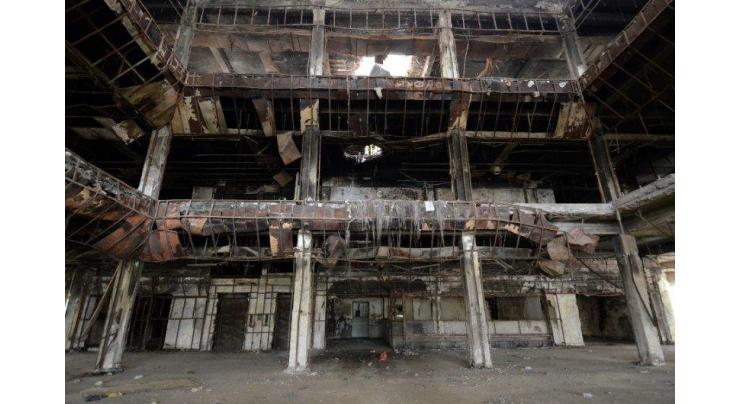
In Iraq, Academics Restock Mosul's Barren Bookshelves
Faizan Hashmi Published May 15, 2019 | 04:00 PM

Watheq Mahmud is pursuing an advanced engineering degree but the textbooks he needs are often missing in his native Mosul, the Iraqi city where militants burned volumes and destroyed libraries
Mosul, Iraq, (APP - UrduPoint / Pakistan Point News - 15th May, 2019 ) :Watheq Mahmud is pursuing an advanced engineering degree but the textbooks he needs are often missing in his native Mosul, the Iraqi city where militants burned volumes and destroyed libraries.
To track down the books, he has had to travel 400 kilometres (250 miles) south to Baghdad, and even a further 600 kilometres to Basra.
"Everything is reversed today. Mosul used to be the hub for students and researchers from all across Iraq and the Arab world," said Mahmud, 33.
"But today, Mosul's people are forced to leave their city in search of education, books, and resources," he added.
For centuries, Mosul was known for its artists and writers, for libraries brimming with books in multiple languages, and for housing Iraq's first printing press.
And although Mosul has been back in government hands since 2017, its young academics see the barren bookshelves as part of IS's dark legacy.
"It's extremely hard for a researcher to complete his dissertation because there are so few resources available," Abdulhamid Mohammad, a 34-year-old pursuing a doctorate in history, told AFP.
Roa al-Hassan, who is studying food science, fears much of her city's written riches will never be recovered.
"Some books were never digitally available, and now they'll be lost forever," she lamented.
- Looted, burned - One of Mosul's most prominent literary hubs was the Central Library, erected in 1921 in the eastern Faysaliyah quarter.
It housed books ranging from donated novels to rare volumes, fragile manuscripts, and old blueprints.
The library even held books in the Syriac language, produced in the 19th century by Iraq's first printing press, across the Tigris river in Mosul's west.
Mosul also boasted several large government collections, a library of religious texts, the Mosul University library, dozens of archives linked to churches and mosques, and even more private bookstores along Nujaifi Street, nicknamed "Culture Boulevard." Those gems were all destroyed in February 2015, when IS fighters looted the Central Library and systematically destroyed other collections, despite howls of protest locally.
Some experts say IS set aside precious manuscripts to sell on the black market, along with ancient artefacts retrieved from heritage sites it had destroyed.
The Iraqi government's recapture of Mosul in 2017 facilitated support to restock the libraries, with donated volumes arriving from all over the world.
"We had 16,338 books before the library was looted and ruined," said Jamal Ahmad Hesso, the associate director of the Central Library.
The library has received 11,758 volumes but is still missing more than a quarter of its previous content, said Hesso.
Mosul's main religious archive once housed around 58,000 books. It now holds 48,000, according to its keeper, Shamel Lazem Tah.
Related Topics
Recent Stories

Under training officers visit Special Branch Headquarters Roberts Club

Industries promotion can help eliminate unemployment : Sindh Minister for Indus ..

Step afoot to ensure durable peace in Balochistan: Ziuallah

PML-N office torching cases: ATC summons PTI leaders, others for indictment on M ..

Oman, UAE deluge 'most likely' linked to climate change: scientists

CRBC tender to be floated by June; Chief Minister Khyber Pakhtunkhwa Sardar Ali ..

122 cases registered against accused involved in drug trafficking

Models, poster and quiz competition held at AIOU

Passco GM, deputy visit wheat procurement centers in Burewala

Non-Muslim Pakistanis enjoy freedom, state patronage: Kundi

Dengue Control Committee gathers in Jhang

BHP launches $38.8 billion takeover bid for rival Anglo American
More Stories From World
-

Oman, UAE deluge 'most likely' linked to climate change: scientists
8 minutes ago -

BHP launches $38.8 billion takeover bid for rival Anglo American
18 minutes ago -

Saudi oil giant Aramco agrees major FIFA sponsorship deal
18 minutes ago -

Putin says plans to visit China in May
18 minutes ago -

Haiti transitional council sworn in after months of violence
1 hour ago -

Ukrainian village battles mines year after Russia forced out
1 hour ago
-

China's Shenzhou-18 mission takes off bound for space station
1 hour ago -

Thousands of flights scrapped as French air traffic controllers strike
1 hour ago -

India's IndiGo to buy 30 A350 planes: Airbus
1 hour ago -

Scottish leader scraps coalition deal with Greens
1 hour ago -

Paris landmark Moulin Rouge's windmill sails collapse
2 hours ago -

155 killed in Tanzania as heavy rains lash East Africa
2 hours ago











